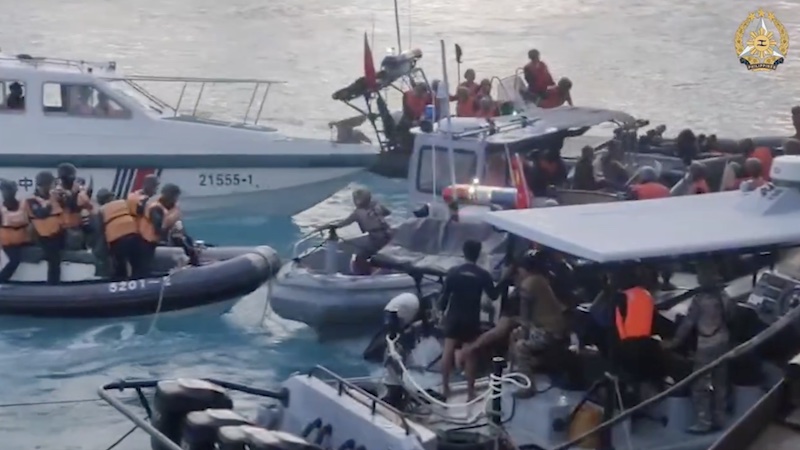
By Jason Gutierrez
Manila and Beijing agreed to “de-escalate tensions” in the South China Sea following atense standofflast month at a disputed shoal, Philippine officials said Tuesday after both sides held bilateral talks on the waterway.
Foreign Affairs Undersecretary Ma. Theresa Lazaro met with Chinese Vice Foreign Minister Chen Xiaodong behind closed doors in Manila for the 9th Bilateral Consultation Mechanism on the South China Sea (BCM), the Philippine Department of Foreign Affairs said in a statement.
The two sides “had a frank and constructive discussion on the situation in the South China Sea,” the statement said, adding that both “affirmed their commitment to de-escalate tensions without prejudice to their respective positions.”
Lazaro, however, told Chen that Manila would remain “relentless in protecting its interests and upholding its sovereignty, sovereign rights and jurisdiction in the West Philippine Sea,” the statement said, using Manila’s name for South China Sea waters within the Philippines’ exclusive economic zone.
Both sides “affirmed their commitment to de-escalate tensions without prejudice to their respective positions,” the statement also said.
Lazaro and Chen, who headed their respective delegations at the talks in Makati, Manila’s financial district, committed to implementing a “maritime communication mechanism” between their countries’ coast guards and to form a joint committee to discusssuch incidents, according to the statement.
It gave no further details on this point, and the two senior diplomats did not hold a joint press conference after their meeting. Similar agreements in the past to set up a South China Sea “hotline” to quickly address bilateral problems as they arise have not been effective.
“There was substantial progress on developing measures to manage the situation at sea, but significant differences remain,” the statement said.
The talks in Manila followed adramatic standoffbetween Filipino servicemen and Chinese coast guard personnel at Second Thomas (Ayungin) Shoal on June 17, during which a Philippine navy sailor lost a finger.
Last week, Washington’s envoy to Manila, MaryKay Carlson, said that international support for the Philippines was growing in the wake of the incident at Ayungin.
U.S. President Joe Biden has stressed that the South China Sea should be “free and open” where local fishermen can ply their trade free from “coercion” from other countries, Carlson told the East-West Media Conference in Manila on June 26.
“With like-minded partners and all who support the rule of law, we urge [China] to cease harassment of Philippine vessels lawfully operating in the Philippine exclusive economic zones, to halt its disruption to states’ sovereign rights to explore, utilize, conserve, and manage natural resources in their territories and EEZs,” the American ambassador said.
Meanwhile on Tuesday, China reiterated its position that Manila’s resupply missions to a Philippine military outpost at the shoal violate its jurisdiction, despitethe reefbeing located within the Philippines’ exclusive economic zone.
“The root cause of the current situation is that the Philippines infringed on China’s rights and made deliberate provocations,” Mao Ning, the Chinese foreign ministry spokeswoman,saidduring a news conference.
“The Philippines needs to stop those infringement activities and provocations at once, and return as soon as possible to the track of resolving differences through dialogue and consultation.”
